Distressing content:
This section of the report contains material that may be confronting, particularly to those affected by the 15 March 2019 terrorist attack.
5.1 Overview
1
In this chapter we discuss the steps in the firearms licensing process that resulted in the individual being granted a firearms licence. Our account is purely descriptive. An evaluation of the adequacy of the process is provided in chapter 6 of this Part.
2
We held a hearing with the firearms licensing staff from New Zealand Police who dealt with the individual’s firearms licence application. The hearing involved separately interviewing each of the firearms staff (under oath or affirmation) on the same day. The purpose of the hearing was to develop a better understanding of the process by which the individual obtained a firearms licence and to identify any issues with the process that was followed.
5.2 The application
3
On 1 September 2017, the individual took the first step towards obtaining a firearms licence by paying the application fee. This was only 15 days after he arrived in New Zealand. Four days later, on 5 September 2017, he undertook and passed the then required theoretical Firearms Safety Course.
4
We considered producing extracts from the individual’s application (as we have for the vetting interview records) but that form consists primarily of identifying details that would have to be redacted. Redacted in this way the form would contain no useful information that goes beyond the description that now follows.
5
On his application, the individual identified his sister Lauren Tarrant (along with her Australian address) and gaming friend as his referees. Upon receipt of the application, the Licensing Clerk for Dunedin spoke to him by phone, telling him that because his sister lived in Australia and could not be interviewed face-to-face, he would need to provide another referee.
6
The individual subsequently nominated gaming friend to replace his sister and gaming friend’s parent to be his other referee. The Licensing Clerk drew a line through Lauren Tarrant’s details on the application form and an arrow from gaming friend’s details to the space where Lauren Tarrant’s details had been recorded and noted gaming friend’s parent as his second referee. A sticky note was attached to the front of the individual’s application form by the Licensing Clerk indicating that gaming friend’s parent would be the “new unrelated referee”. The effect of the form as amended was that gaming friend was treated as the near-relative referee.
7
When giving evidence to us, the Licensing Clerk did not remember the details of the interactions with the individual but was reasonably confident that they had asked the individual how long he had known gaming friend. This would have been in accordance with the usual process in relation to referee substitution.
8
The application form recorded the details of both referees, with the address of the two referees being the same and located in Waikato. It also described the relationship between the individual and both referees as “friend”.
9
Other information provided by the individual on his application form included that he was unemployed and he was born in Australia.
10
Having provisionally accepted the referees as suitable, the Licensing Clerk entered the individual’s application into New Zealand Police’s National Intelligence Application database on 19 September 2017. The Licensing Clerk completed the National Intelligence Application checks on the individual and the two referees and placed the results on the licence application file.
11
Gaming friend and their parent both held firearms licences with B and E Endorsements. This entitled them to possess pistols and military style semi-automatic firearms and indicated that they had already been subject to New Zealand Police vetting that was more extensive than that required for the standard firearms licence the individual was applying for.
12
The individual’s National Intelligence Application printout contained minimal information. He had no criminal history and no known criminal associates. The only additional information on his National Intelligence Application record, besides his name and contact details, related to his car accident in 2013 (see Part 4: The terrorist).
13
The individual’s contact details recorded two home addresses, the first being an address in Grafton, Australia. This was the address given by the individual when his details were recorded by a New Zealand Police Officer who attended the car accident in 2013. The second was the individual’s Dunedin address.
14
Gaming friend was known to New Zealand Police and the New Zealand Customs Service due to their attempted importation of an offensive weapon and firearm parts without the necessary permits to import. This information was on their National Intelligence Application printout when the Firearms Licensing Clerk reviewed it. New Zealand Customs Service’s records note the following:
- In May 2014, gaming friend tried to import a knuckleduster knife. Knuckledusters are considered offensive weapons and require a New Zealand Police permit to import them. The item was intercepted by New Zealand Customs Service at the border. New Zealand Customs Service officers contacted New Zealand Police who confirmed that gaming friend did not have the necessary permit. The knuckleduster knife was, therefore, seized.
- In December 2015, gaming friend tried to import four firearm parts - one cheek riser for a Magpul CTR/MOE stock, one AK47 Nato US stock, one AR15 buttstock extension tube and one AKM4 stock adapter for a collapsible stock. The items were intercepted by New Zealand Customs Service at the border. As gaming friend did not have the required import permit, the items were seized.
15
Following the December 2015 incident, the District Arms Officer in Waikato contacted gaming friend, gave them a verbal warning and told them that they would not receive the items.
16
The National Intelligence Application printout for gaming friend’s parent showed they had four convictions:
- refusing an officer’s request to undergo an evidential blood test on 14 July 1989;
- producing a logbook33 that contained false particulars on 14 July 1989;
- producing a logbook that omitted a material particular on 14 July 1989; and
- driving with an excess proportion of alcohol in their breath on 15 March 1991.
17
The Licensing Clerk and former District Arms Officer both gave evidence that, although they could not remember the specifics of the application, they would have discussed between themselves the appropriateness of gaming friend and their parent as referees. Neither regarded the information on the National Intelligence Application forms as disqualifying them from being referees. As noted above, gaming friend and their parent were firearms licence holders with B and E Endorsements. The incidents recorded in the National Intelligence Application had not been serious enough to prevent gaming friend and their parent obtaining, or to result in them losing, their endorsements or their firearms licences. That they held licences and endorsements was seen as outweighing the incidents recorded on the National Intelligence Application.
18
Being satisfied that gaming friend and their parent were appropriate referees, and there being no information on the individual’s National Intelligence Application to disqualify him from applying for a firearms licence, the former District Arms Officer arranged for the relevant parts of the file to be sent to Vetting Officers.
19
The individual and his referees lived in different Districts. This required different Vetting Officers to conduct the interviews. A part file was sent to each Vetting Officer, containing the part of the Firearms Licence Vetting Guide relevant to the interview being conducted by the particular Vetting Officer. The former District Arms Officer did not direct the Vetting Officers to make particular inquiry (that is beyond what is provided for in the Firearms Licence Vetting Guide) into the relationships between the individual and his referees.
20
The individual was interviewed at his home by a Dunedin-based Vetting Officer (Dunedin Vetting Officer) on 4 October 2017. He told the Dunedin Vetting Officer that he had previously resided in New South Wales, had moved to his Somerville Street address five weeks earlier and was unemployed.
Figure 19: Extract 1 from the notes of the individual’s vetting interview
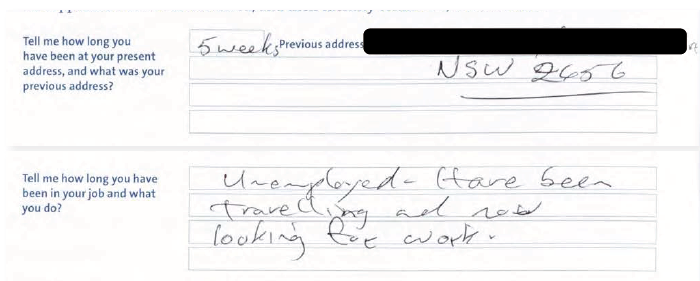
Unemployed - Have been travelling and now looking for work.
21
When asked why he wanted a firearms licence, the individual said that he wanted it for hunting, leisure, target shooting and sport.
Figure 20: Extract 2 from the notes of the individual’s vetting interview

Hunting & leisure. Target & sport.
22
The individual told the Dunedin Vetting Officer that he intended to use firearms at rifle and pistol clubs and “hunting locally”. He described his experience with firearms as consisting of going to “the range with a friend a few times”. The individual said he was interested in using firearms for the purposes of “target shooting”.
Figure 21: Extract 3 from the notes of the individual’s vetting interview
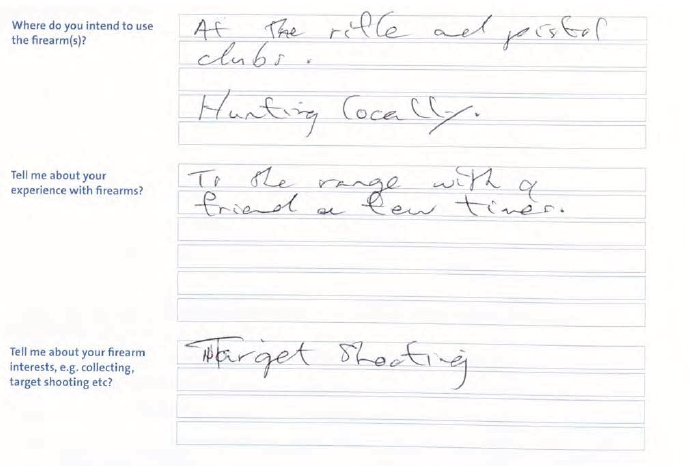
At the rifle and pistol clubs.
Hunting locally.
To the range with a friend a few times.
Target shooting.
23
He also stated that he had no psychological conditions, substance abuse issues or head injuries and was not using any medication.
Figure 22: Extract 4 from the notes of the individual’s vetting interview
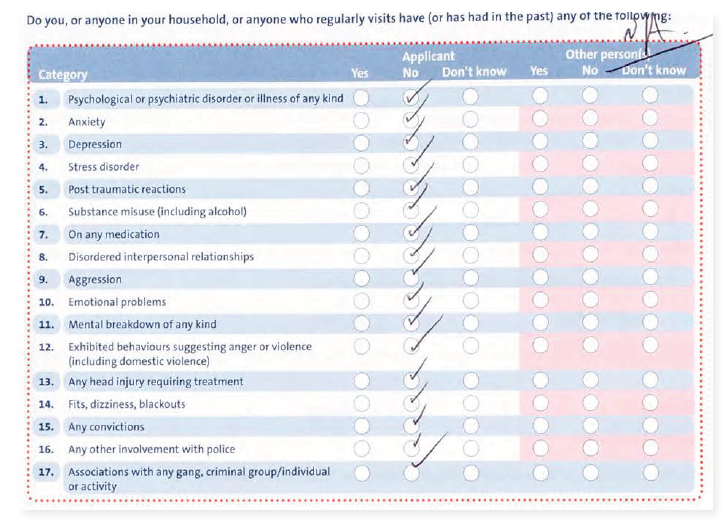
24
The individual said he considered himself to be suitable to have firearms because he was “a responsible person” and he did not have any concerns for the safety of any person if he had firearms. He said he held this view because did not “have any [enemies]”. The individual did not know of any other relevant information that may have impacted the decision to issue him with a firearms licence.
Figure 23: Extract 5 from the notes of the individual’s vetting interview
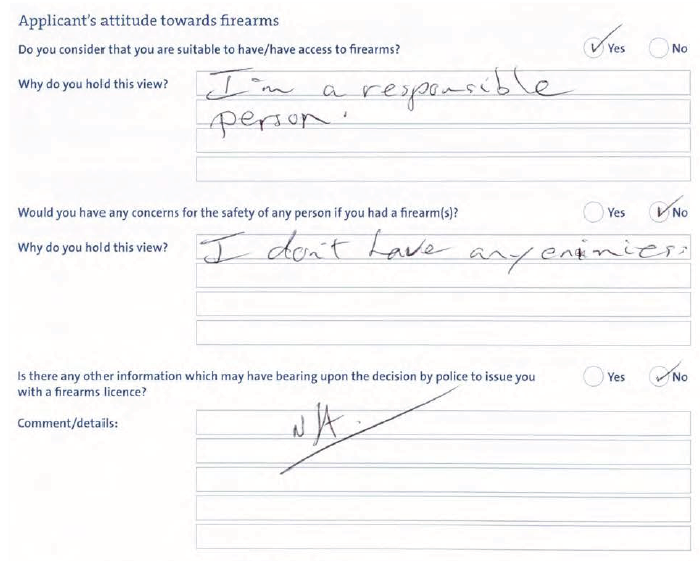
I’m a responsible person.
I don’t have any [enemies].
N/A [Not applicable].
25
He claimed to have “now met people at pistol and rifle clubs”. In their notes, the Dunedin Vetting Officer recorded that the individual “did not show any unusual behaviour during the visit or interview”.
Figure 24: Extract 6 from the notes of the individual’s vetting interview
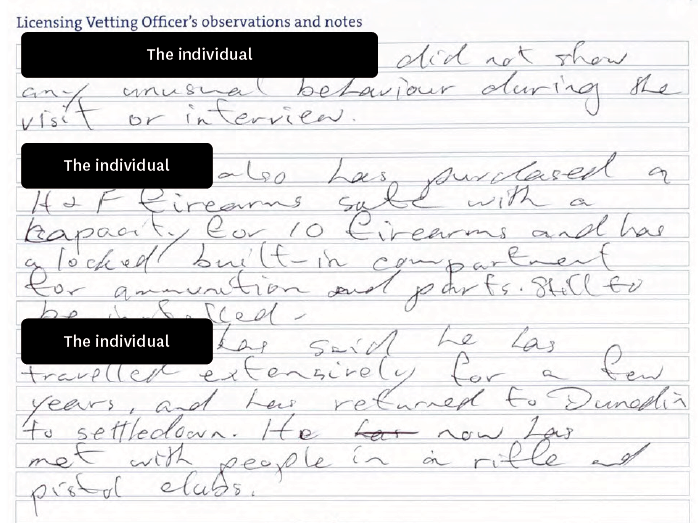
[The individual] did not show any unusual behaviour during the visit or interview.
[The individual] also has purchased a H&F firearms safe with a capacity for 10 firearms and has a locked built-in compartment for ammunition and parts. Still to be installed.
[The individual] has said he has travelled extensively for a few years, and has returned to Dunedin to settledown. He has now has met with people in a rifle and pistol clubs.
26
The Dunedin Vetting Officer also checked and confirmed that the individual had appropriate firearms storage facilities in his home. As a result the Dunedin Vetting Officer recommended that the application be approved.
Figure 25: Recommendation by the Dunedin Vetting Officer
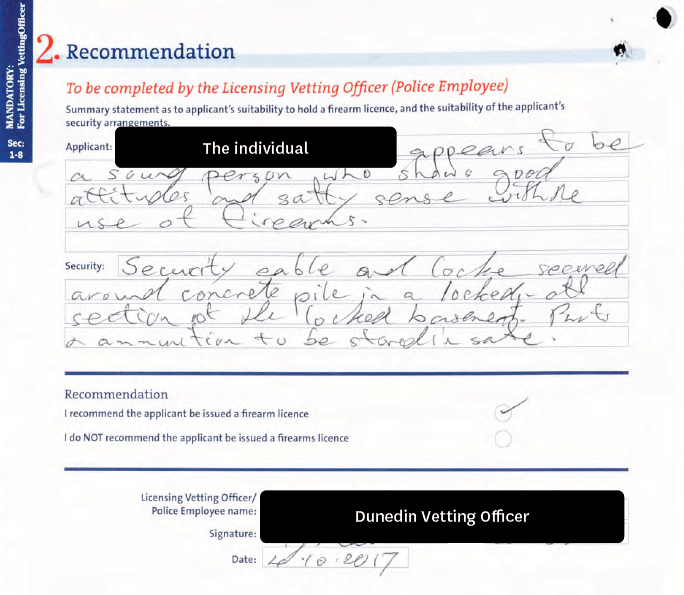
Applicant: [The individual] appears to be a sound person who shows good attitudes and safety sense with the use of firearms.
Security: Security cable and lock secured around concrete pile in a locked-off section of the locked basement. Parts and ammunition to be stored in safe.
27
A different Vetting Officer (Waikato Vetting Officer) carried out interviews with gaming friend on 30 October 2017 and gaming friend’s parent on 2 November 2017, both at their home in Waikato. That Waikato Vetting Officer had previously audited their secure storage facilities for their pistols and military style semi-automatic firearms.
28
At the top of the Firearms Licence Vetting Guide, the Waikato Vetting Officer recorded that gaming friend was being interviewed as a substitute for the near-relative referee as the individual had “no relatives” in New Zealand. They also noted that the individual had “recently arrived from Australia”. During the vetting interview, gaming friend described the individual as a friend. They said that their initial contact with the individual, ten years earlier, had been through “video games etc” and that they had been in regular contact since. They noted the individual was an Australian, “widely travelled” and had recently come to New Zealand and would “probably settle here”.
Figure 26a: Extract 1 from the notes of gaming friend’s vetting interview

Interviewed as NOK [next of kin] as applicant has no relatives in NZ. Recently arrived from Australia.
Figure 26b: Extract 2 from the notes of gaming friend’s vetting interview

Figure 26c: Extract 3 from the notes of gaming friend’s vetting interview

Made contact 10 yrs ago via video games etc – Regular contact. He’s widely travelled. From Australia – recently came to NZ, will probably settle here.
29
Gaming friend’s parent also described the individual as a friend and said they had known him for four years.
Figure 27: Extract 1 from the notes of gaming friend’s parent’s vetting interview

30
The vetting notes record that gaming friend said the individual wanted access to firearms for the purpose of recreational hunting and, possibly, access to B Endorsements later for competition shooting. The answer of gaming friend’s parent was similar, but also noted that the individual wished to carry out target shooting.
Figure 28: Extract 4 from the notes of gaming friend’s vetting interview

For recreational hunting.
Maybe a B endorsement later for competitions.
Figure 29: Extract 2 from the notes of gaming friend’s parent’s vetting interview

For hunting and targets.
31
Both referees considered the individual to be safe with firearms. Gaming friend said the individual was “well aware of safety and proper handling of firearms” and that he was a sensible, responsible person. Gaming friend’s parent stated that the individual was a “good, outstanding young man” and gave their opinion that the individual was “good and safe” with firearms.
Figure 30a: Extracts 5 from the notes of gaming friend’s vetting interview

Good – well aware of safety and proper handling.
Personal observation.
Figure 30b: Extracts 6 from the notes of gaming friend’s vetting interview

A sensible responsible person.
Figure 31a: Extract 3 from the notes of gaming friend’s parent’s vetting interview

A good outstanding young man.
A nice person.
Figure 31b: Extract 4 from the notes of gaming friend’s parent’s vetting interview

Good and safe.
Personal observation.
32
Both referees said that they had shot with the individual and supported his application (see Part 4, chapters 2 and 4).
Figure 32: Extract 7 from the notes of gaming friend’s vetting interview

Been to range with me 3 times, used A & B category firearms.
Figure 33: Extract 5 from the notes of gaming friend’s parent’s vetting interview

Been out with me – done some range shooting and instructed in care and safety with firearms.
33
Gaming friend’s parent was asked “Do you know of any reason whatsoever as to why police should refuse to issue a firearms licence to the applicant?” They replied “No”. When asked “Why do you hold this view?”, the gaming friend’s parent’s response is recorded as “No reasons known” and “Fully supportive”.
Figure 34: Extract 6 from the notes of gaming friend’s parent’s vetting interview
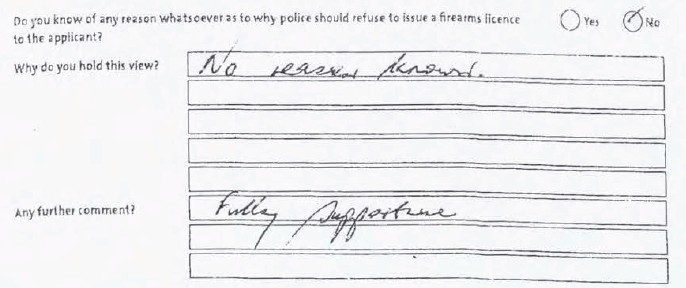
No reasons known.
Fully supportive.
34
Gaming friend’s response to the same set of questions is recorded as “No reasons known”.
Figure 35: Extract 8 from the notes of gaming friend’s vetting interview

No reasons known.
35
No overseas inquiries were made by the Vetting Officers, Licensing Clerk or former District Arms Officer. The individual’s sister Lauren Tarrant was not contacted as part of the application process. The individual had disclosed at his interview that he had received speeding tickets when he was younger but no criminal checks were made with Australian authorities to confirm his (accurate) assertion that he had no convictions.
Figure 36: Extract 7 from the notes of the individual’s vetting interview
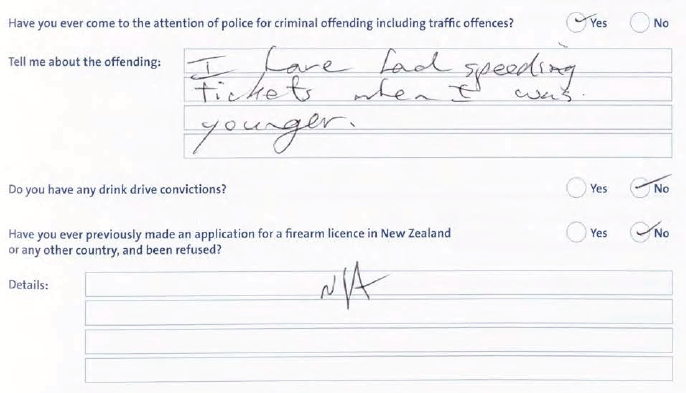
I have had speeding tickets when I was younger.
N/A [not applicable]
36
No medical records or reports were requested as the individual did not present with any noticeable health issues (mental or otherwise) during the interview, nor did he disclose any. Additionally, the referees did not suggest the individual suffered any health (including mental health) issues.
37
On 16 November 2017, the complete licence application file was reviewed by the former District Arms Officer. Based on the information in the file, the former District Arms Officer saw no reason to conclude that the individual had not satisfied the fit and proper person test. Accordingly, the former District Arms Officer granted the individual’s firearms licence the same day.
38
There is no record of when the licence was issued, but the individual would likely have received it via post approximately two weeks later. We know he had it by 4 December 2017, as this was the day he acquired his first firearm.
5.3 Concluding comments
39
In the next chapter, we will assess the adequacy of the process that we have just discussed. The key aspects we will discuss are the decision not to interview Lauren Tarrant, the acceptance of gaming friend as a substitute for Lauren Tarrant and the interviews of gaming friend and their parent conducted by the Waikato Vetting Officer.
33. Logbooks are required to be filled out by drivers of certain vehicles (for example, vehicles that are used in a transport service). These logbooks must contain certain details, such as start and finish times for all periods of work. It is an offence to produce a logbook that omits one of the required details or to produce a logbook that contains false details.

